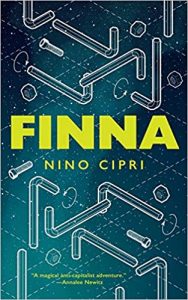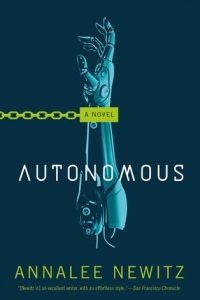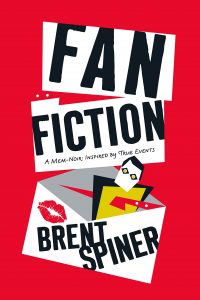Gary K. Wolfe Reviews Finna by Nino Cipri
 Finna, Nino Cipri (Tor.com 978-1-250-24573-1, $14.99, 138pp, tp) February 2020.
Finna, Nino Cipri (Tor.com 978-1-250-24573-1, $14.99, 138pp, tp) February 2020.
I suppose the giant retail emporium has served as a portal into shadowy realms at least since John Collier’s “Evening Primrose” almost eighty years ago, but the deliberately labyrinthine layout of IKEA stores seems almost designed for creepy stories – something that Nino Cipri enthusiastically takes advantage of in their novella Finna, which is partly a testy workplace romance and partly a surreal consumer-satire horror story. Cipri doesn’t use the name IKEA, of course, though the giant “LitenVärld” home furnishings store features the familiar garish blue-and-yellow design, and the prospect of losing a grandmother among the endless showrooms sounds entirely reasonable to anyone who’s spent time there. And it is indeed a lost grandmother that precipitates the plot of Finna. It seems she might have slipped through one of the shimmering wormholes that pop up so often in LitenVärld stores that they even have an ancient training video about how to handle them. Ava, already in a foul mood because of her recent breakup with Jules, because she’s been called in on her day off, and because she hates her soul-deadening job in the first place, now finds herself assigned to work with Jules to track down the missing granny, possibly through an entire series of alternate LitenVärlds. To assist them, they’re given a rather clunky device called a FINNA, which “using quantum entanglement” helps “navigate the series of wormholes that the lost person may have wandered through”.
Obviously, Cipri’s cavalier use of quantum terminology is cheerful nonsense, and a better clue to the sources of the novella’s tone is when Jules, seeing the first wormhole, calls it a “wrinkle in time.” Cipri has a lot of fun describing the prepackaged styles of the store’s various display rooms (“Pastel Goth Hideaway,” “Pan-Asian Appropriating White Yoga Instructor”), and even more fun conjuring up alternate versions of the store in which consumer-nightmare metaphors are made literal; in one, an inviting wingback chair turns out to be a human-sized Venus Flytrap, while in another, payment in the food court is made literally in blood, and the cashiers are all identical to either Mark or Dana – the generic figures Ava remembers from the training video. When an army of these feral Marks and Danas starts pursuing Ava, Jules, and the version of the grandmother they have rescued, the tone shifts easily into horror-suspense mode, but in a winking manner that suggests R.L. Stine more than Stephen King. Throughout, though, the bantering relationship between the queer Ava (“her”) and the nonbinary Jules (“them”) gets tested in a way that seems to point to a facile reconciliation-under-stress ending, but Cipri is too clever to let us off that easily. While some of the secondary characters, like the officious, by-the-book manager Tricia, seem drawn from the standard bad-workplace playbook, both Ava and Jules are complex and edgy enough to lend Finna a rather touching human dimension beneath the well-targeted satire and the surreal adventures.
Gary K. Wolfe is Emeritus Professor of Humanities at Roosevelt University and a reviewer for Locus magazine since 1991. His reviews have been collected in Soundings (BSFA Award 2006; Hugo nominee), Bearings (Hugo nominee 2011), and Sightings (2011), and his Evaporating Genres: Essays on Fantastic Literature (Wesleyan) received the Locus Award in 2012. Earlier books include The Known and the Unknown: The Iconography of Science Fiction (Eaton Award, 1981), Harlan Ellison: The Edge of Forever (with Ellen Weil, 2002), and David Lindsay (1982). For the Library of America, he edited American Science Fiction: Nine Classic Novels of the 1950s in 2012, with a similar set for the 1960s forthcoming. He has received the Pilgrim Award from the Science Fiction Research Association, the Distinguished Scholarship Award from the International Association for the Fantastic in the Arts, and a Special World Fantasy Award for criticism. His 24-lecture series How Great Science Fiction Works appeared from The Great Courses in 2016. He has received six Hugo nominations, two for his reviews collections and four for The Coode Street Podcast, which he has co-hosted with Jonathan Strahan for more than 300 episodes. He lives in Chicago.
This review and more like it in the April 2020 issue of Locus.
 While you are here, please take a moment to support Locus with a one-time or recurring donation. We rely on reader donations to keep the magazine and site going, and would like to keep the site paywall free, but WE NEED YOUR FINANCIAL SUPPORT to continue quality coverage of the science fiction and fantasy field.
While you are here, please take a moment to support Locus with a one-time or recurring donation. We rely on reader donations to keep the magazine and site going, and would like to keep the site paywall free, but WE NEED YOUR FINANCIAL SUPPORT to continue quality coverage of the science fiction and fantasy field.







